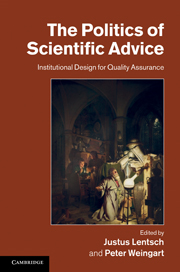Book contents
- Frontmatter
- Contents
- List of figures
- List of tables
- Acknowledgements
- Biographical notes
- Part I Methodological issues: quality control and assurance in scientific policy advice
- 1 Introduction: the quest for quality as a challenge to scientific policy advice: an overdue debate?
- 2 Quality control and peer review in advisory science
- 3 Reconciling representation with reality: unitisation as an example for science and public policy
- 4 Looking for quality in all the wrong places, or: the technological origins of quality in scientific policy advice
- Part II Collegial science advisory bodies
- Part III Collegial science policy advisory bodies
- Part IV Research-based advisory organisations
- Part V Academies of science
- Index
- References
3 - Reconciling representation with reality: unitisation as an example for science and public policy
Published online by Cambridge University Press: 25 October 2011
- Frontmatter
- Contents
- List of figures
- List of tables
- Acknowledgements
- Biographical notes
- Part I Methodological issues: quality control and assurance in scientific policy advice
- 1 Introduction: the quest for quality as a challenge to scientific policy advice: an overdue debate?
- 2 Quality control and peer review in advisory science
- 3 Reconciling representation with reality: unitisation as an example for science and public policy
- 4 Looking for quality in all the wrong places, or: the technological origins of quality in scientific policy advice
- Part II Collegial science advisory bodies
- Part III Collegial science policy advisory bodies
- Part IV Research-based advisory organisations
- Part V Academies of science
- Index
- References
Summary
Introduction: why ‘getting the science right’ is wrong
We live in a world where science is routinely called upon to provide information to policymakers under the presumption that science can identify and guide sensible decisions. But the presumption of clear guidance is undermined by the complexity of the natural world and the various uncertainties that surround scientific knowledge of it. Nowhere is this more so than in the arena of environmental policy, where we deal with complex natural systems with multiple relevant causal factors, and empirical parameters that may be difficult (or even impossible) to measure. There are always things we do not know; we never have complete information. So how do we know when we have enough scientific information to properly inform a decision?
In recent years, delay in the face of uncertainty has been developed as a political strategy. Given incomplete information, it can be comfortable and convenient for politicians to suggest that in the face of uncertainty it is prudent to do more research. It can also be expedient for those who have a vested interest in the status quo to insist that the available scientific information is insufficient to warrant change.
Scientists may inadvertently or implicitly bolster such strategies, because it is in the nature of scientific inquiry to focus on the unknown. Uncertainty defines the research frontier, so the habit of most scientists is to emphasise the unresolved aspects of problems rather than the settled ones.
- Type
- Chapter
- Information
- The Politics of Scientific AdviceInstitutional Design for Quality Assurance, pp. 36 - 53Publisher: Cambridge University PressPrint publication year: 2011
References
- 2
- Cited by



